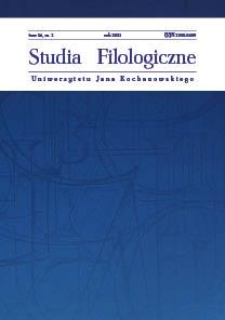Biblioteka Cyfrowa Uniwersytetu Jana Kochanowskiego udostępnia 13 273 obiektów cyfrowych
Obiekt
Tytuł: Siding with Things or Parting with Things? The Ambiguities of Francis Ponge’s Prose Poems in Selected Polish and English Translations
Twórca:
Tytuł publikacji grupowej:
Abstrakt:
The basic controversy of Ponge’s prose poems is whether they are the expression of things in themselves or mere linguistic games with no anchoring in the world. This controversy may be indicative of a feature that is fundamental to Ponge’s writing, namely, ambiguity. In the paper I will examine whether the ambiguity inherent in Ponge’s carefully crafted literary explorations is something (in)expressible beyond French. Ponge often heightens the impression of ambiguity with puns and false etymologies which, in some cases at least, find their direct equivalents in the English lexicon. Polish translators have no such vocabulary at hand that would easily mirror French or English intricate etymologies and pseudo-etymologies. I am discussing in detail three Polish translations from Ponge: Chleb by Kozak, Ślimaki by Gondowicz, and Skrzynka by Wasilewska & Kurek. English translations were used as a backdrop for presenting the challenges of translating Ponge into Polish. The issue at stake in these three Polish translation projects is whether Ponge in Polish is able to transcend the solipsistic cognitive bubble and bridge the gap between language and the world, the subject and the object, or the human and the thing.
Miejsce wydania:
Opis fizyczny:
ISSN:
Wydawca:
Wydawnictwo Uniwersytetu Jana Kochanowskiego w Kielcach
Data wydania:
Identyfikator:
oai:bibliotekacyfrowa.ujk.edu.pl:13617 doi:10.25951/4728
Język:
Jest częścią:
Studia Filologiczne Uniwersytetu Jana Kochanowskiego
Ma część:
Typ:
Prawa dostępu:
Format:
Kolekcje, do których przypisany jest obiekt:
- Biblioteka Cyfrowa Uniwersytetu Jana Kochanowskiego > Wydawnictwo Uniwersyteckie
- Biblioteka Cyfrowa Uniwersytetu Jana Kochanowskiego > Wydawnictwo Uniwersyteckie > Wydawnictwa ciągłe
- Biblioteka Cyfrowa Uniwersytetu Jana Kochanowskiego > Wydawnictwo Uniwersyteckie > Wydawnictwa ciągłe > „Studia Filologiczne Uniwersytetu Jana Kochanowskiego”
Data ostatniej modyfikacji:
18 gru 2025
Data dodania obiektu:
18 gru 2025
Liczba wyświetleń treści obiektu:
0
Wszystkie dostępne wersje tego obiektu:
https://bibliotekacyfrowa.ujk.edu.pl/publication/4728

